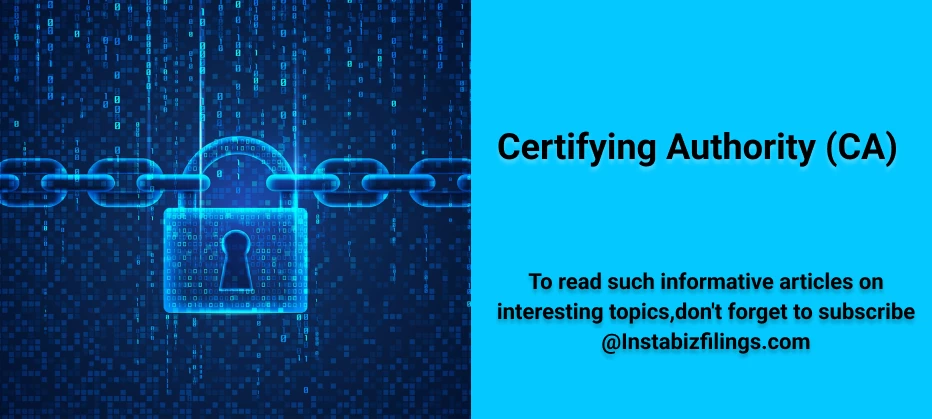
Certifying Authority (CA)
September 4, 2025 by Team Instabizfilings
What is a Certifying Authority (CA)?
A Certifying Authority (CA) is a third party that certifies a digital certificate utilized in confirming the identity of an individual or organisation or a device over the Internet. The certificates are instrumental in the use of Public Key Infrastructure (PKI) that helps in executing encryption, authentication and digital signatures to verify that digital communication is secure.
Consider a CA to be a digital notary. As is the case with a notary who ensures that the documents are authentic in the real world, a CA ensures that the digital identities are authentic and vouched in the virtual world.
Functions of a Certifying Authority
A Certifying Authority performs several critical tasks to ensure secure digital interactions:
-
Issuance of Digital Certificates: Identifies those who have applied and issues a digital certificate that contains a public key and information of the applicant.
-
Certificate Lifecycle Management
- Renewal of expired certificates
- Revocation of compromised or invalid certificates
- Suspension in cases under investigation
-
Maintaining Certificate Revocation Lists (CRLs) : Lists of certificates that are no longer valid and must not be trusted.
-
Publishing Public Keys : Permits digital certificates to be distributed so that others may verify the public key holder’s identity.
-
Ensuring Legal and Regulatory Compliance : Operates under laws like the IT Act (India), eIDAS Regulation (EU), or industry standards (WebTrust, ETSI, etc.).
How Does a Certifying Authority Work?
-
Key Pair Generation: This is the situation in which the user or the system generates a private key and a public key.
-
Certificate Signing Request (CSR): What is sent to the CA is a request containing the public key and identity information.
-
Identity Verification: The CA will verify the identity of the person requesting documentation and/or by a background check.
-
Certificate Issuance: The CA issues a Digital Certificate vouching for the identity with the respective public key in case it's authentic.
-
Digital Signature: The CA digitally signs the certificate using its own private key, making it verifiable and trusted.
-
Usage in Communication: The digital certificate is then used for secure operations like email encryption, code signing, SSL/TLS for websites, etc.
Types of Digital Certificates Issued by a CA
- SSL/TLS Certificates: Applied by the websites in setting the HTTPS mode and encrypting the communication flow between browsers and servers.
- Code Signing Certificates: Provide an option of signed applications to sign applications to guarantee integrity and authenticity of the code by the software developers.
- Email Certificates (S/MIME): Apply email encryption and message signing to determine the confidentiality and validity of the messages sent through email.
- Client Certificates: Applied to acknowledge users or devices of a secure network.
- Document Signing Certificates: Applied to digitally sign the PDFs and other documents that have their legal weight.
Types of Certifying Authorities
-
Root CA
- The highest level Certificate Authority in a PKI.
- Browsers or operating systems do trust their self-authorised certificate.
-
Intermediate CA
- The Root CA issued these.
- Takes care of issues concerning the issuance of certificates in the name of the Root CA as a way of improving security.
-
Public CAs vs Private CAs
- DigiCert, Sectigo, and GlobalSign are public CAs that sell certificates to the general population.
- Internal CAs are applied within the organisation itself only in cases of internal encryption and authentication.
Certifying Authority in India (Example)
Under the Information Technology Act, 2000, the Controller of Certifying Authorities (CCA) regulates all CAs in India. Some licensed CAs in India include:
These authorities issue Class 3 and Document Signer Certificates for e-filing, digital signatures, GST, and more.
Why Are Certifying Authorities Important?
-
Security: Secure, encrypted communication via the internet is ensured.
-
Authentication: States the identity of sites, individuals and systems.
-
Trust: Establishes confidence in the users through the elimination of phishing, fraud, and identity theft.
-
Legal Validity: Digital certificates are recognised with legal validity and fitted in-court admissible digital signatures.
-
E-commerce & Online Services: Can hardly be done without banking, payment gateway, online contracts, etc.
Challenges Faced by Certifying Authorities
-
Trust Management: Causing them not to use their certificates in shoddy ways.
-
Cybersecurity Threats: CAs make highly lucrative targets of hackers.
-
Regulatory Compliance: Has to comply with high national and international standards.
-
Revocation Handling: Role of revoked certificates to be mistakenly accepted.
Conclusion
The backbone of digital trust in the current online environment is a Certifying Authority (CA). Whether done during secure online banking operations or during the signing of a document, CAs are establishing trust in the digital world by making sure that the identity behind any form of digital communication is authentic. With the increasing digital world, the role of the CAs becomes more central to the security of information, privacy, and trust.
Disclaimer
The information provided in this blog is purely for general informational purposes only. While every effort has been made to ensure the accuracy, reliability and completeness of the content presented, we make no representations or warranties of any kind, express or implied, for the same.
We expressly disclaim any and all liability for any loss, damage or injury arising from or in connection with the use of or reliance on this information. This includes, but is not limited to, any direct, indirect, incidental, consequential or punitive damage.
Further, we reserve the right to make changes to the content at any time without prior notice. For specific advice tailored to your situation, we request you to get in touch with us.

Need more details? We can help! Talk to our experts now!
Start Your Business Registration – Talk to Our Experts Now!

Still Confused?
Talk to experts? Fill in the information and we will reach out in 24 Working Hours.

